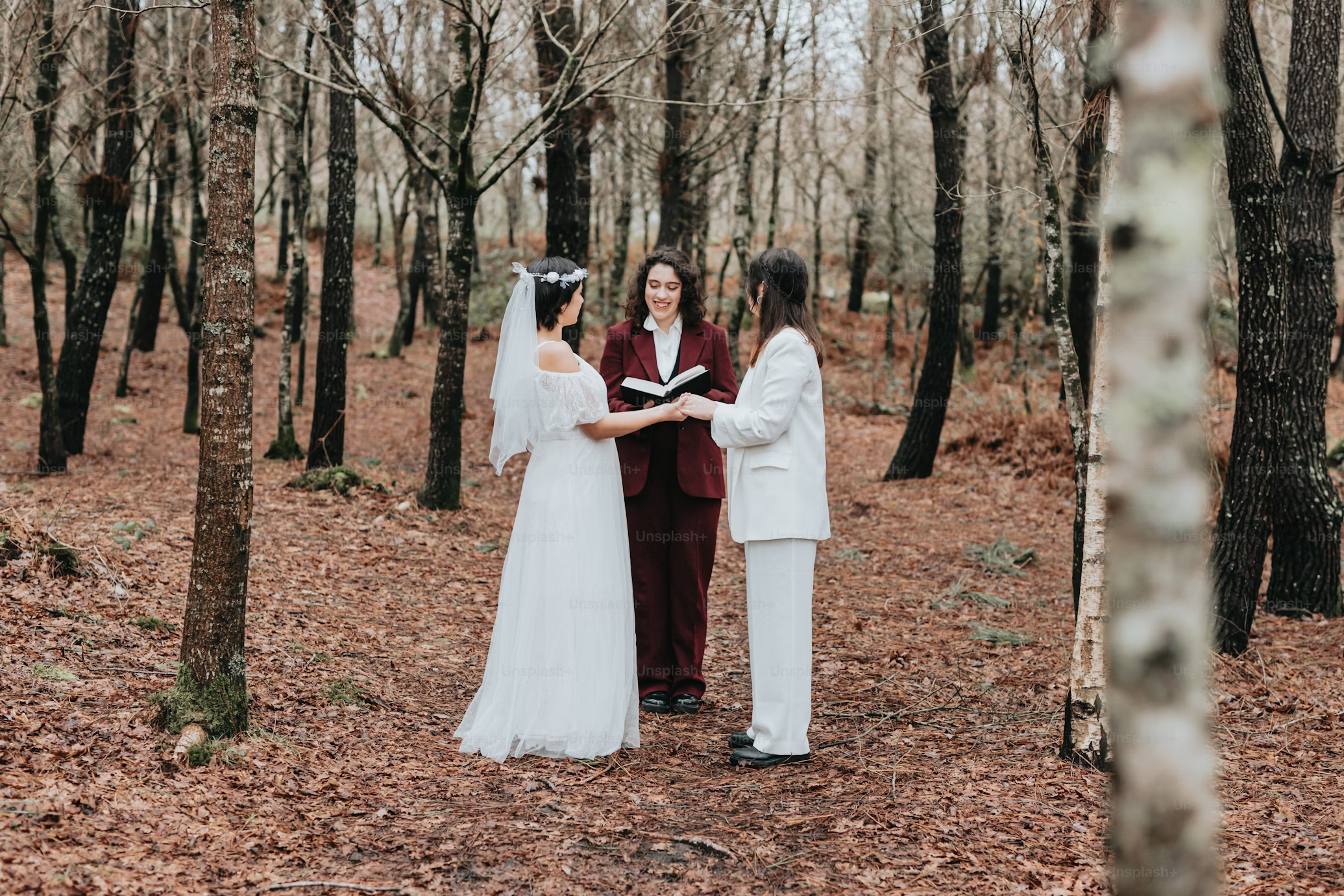- Expert advice/
- Wedding planning 101/
- Creating a budget/
- Who Pays For The Wedding? Everything You Need To Know
- Creating a budget
Who Pays For The Wedding? Everything You Need To Know
Last updated September 10, 2025

One of the biggest challenges of planning a wedding is figuring out your budget. Before you can even begin to delve into how much you can spend on the big day, a crucial first step is to determine who is contributing funds. But who pays for the wedding?
The short answer: It depends. Some couples pay for the wedding entirely on their own, while others have full or partial financial support from their families (and, in some cases, friends or guests). Read on for all of your need-to-knows and wedding etiquette regarding who pays for what.
Who pays for the wedding?
The etiquette surrounding who pays for or contributes financially to a wedding has outgrown traditional “rules”—namely, the rule that states that the bride’s family pays for the wedding. In contrast, the groom’s family pays for the rehearsal dinner and honeymoon.
That is to say, like most aspects of the modern wedding, it’s entirely up to you, the couple, to decide whether or not you request or accept any financial assistance that is offered to you. People—such as either of your parents, family members, close friends, and even wedding party members—may offer to foot the bill for your big day or contribute to specific portions. However, many modern couples will find themselves covering their own wedding costs. Neither of these scenarios is right or better than the other. It simply comes down to everyone’s unique situation.
Every couple’s situation regarding who pays for what is entirely unique. Some couples may request financial help from loved ones, while others take on the full financial responsibility of their ceremony, wedding reception, and all that leads up to them. In either case, there’s some traditional etiquette that you might or might not choose to abide by.
- Never assume that someone can or will contribute financially.
- Never pressure anyone to pay for your wedding.
- Always ask respectfully.
- Always let the other person decide how much (if anything) to contribute.
That said, let’s take a look at each person or group of people that might contribute financially to your wedding.
What do the families pay for?
You may also ask for (or be offered) financial assistance by both or either of your parents and/or family members. Most couples today (41%) are paying in part for their wedding, with family often covering a portion of expenses. This has long been seen as traditional and good etiquette throughout different parts of the world, but nowadays shouldn’t be assumed. With that in mind, if your families do decide to help pay, here’s what their money is likely to go towards.
In short: Families pay for all or partial wedding expenses. But let’s get into a bit more detail. Traditional etiquette in most places suggests that the parents of the bride cover most of the wedding day’s expenses. This includes the venue, catering, decor, entertainment, photographer, and potentially a wedding planner. It’s also quite traditional for the mother of the bride to give the bride their wedding dress.
On the other hand, traditional etiquette also suggests that the groom’s parents cover the cost of the rehearsal dinner, honeymoon, alcohol at the wedding reception, their son’s partner’s wedding band, and their son’s attire. The groom’s family also traditionally pays the officiant and the officiant’s fee.
However, parents and family members typically do not pay for your engagement rings, additional personal gifts to the couple and/or wedding party, travel and accommodations for your guests, bachelor and bachelorette parties, and groom and wedding party attire (outside of their own).

What do the bride and groom pay for?
As is often seen with modern weddings, you and your partner may choose or be put in a situation that requires you to cover the cost of the wedding. According to Zola's First Look Report 2024, ⅓ of couples cover all their wedding costs alone. Many couples will choose this route to have complete control over their wedding planning. Others are simply in a financial situation that allows them to do so. Regardless of the why, let’s talk about what you’ll be paying for.
Until you speak with your family about whether or not they will be contributing financially, it’s always safe to assume that you’ll be completely responsible for all expenses—often with the exception of a few things (more on that below). In short, expect and be prepared to foot the bill for your attire (including wedding rings and a wedding gown and/or suit), ceremony and reception (including your wedding venue, decor, floral arrangements, etc.), and legal paperwork, such as your marriage license.
How do you ask your family for financial help for your wedding?
Asking for financial help can be intimidating. However, the conversation can go well so long as you’re kind and not expectant. Sit down with either set of parents (or both) and graciously ask if they would like to contribute to your wedding budget. Remember: Never assume that they will contribute—and don’t dictate any amounts.
What does your bridal party pay for?
Finally, traditional etiquette states that bridesmaids, groomsmen, and other members of your wedding party (such as the maid of honor and best man) cover certain costs, as well. However, this highly depends on where you live and what’s common in your area.
Members of the wedding party often pay for their attire (bridesmaids’ dresses, groomsmen’s suits, etc.), travel and accommodations costs (if applicable), the bachelor and/or bachelorette parties, a bridal or wedding shower, and individual (or couple’s) wedding gifts. Be aware, though, that in many areas, it’s common for the bride(s) and/or groom(s) to pay for attire or even hair and makeup on the day of as a gift.

Is there anything your guests pay for at your wedding?
Certain items related to your wedding are typically paid for by your close friends and/or members of your guest list. While they won’t cover the cost of your vendors or venue, it’s still important to consider these costs and know how to approach and work around them.
In short, guests may pay for small-ticket wedding gifts off of your wedding registry, as well as their travel and accommodation costs (when applicable). That said, some modern couples might contribute to travel-by-car by sending guests Uber or Lyft gift cards as wedding favors. These aren’t expected of the couple, but they can help guests get to and from your wedding safely.
You can make this less awkward and more direct by requesting specific gifts and/or cash funds through your wedding registry. If you would like your guests to contribute toward an item specifically for the wedding, such as a photo booth or food truck, you can set up a group gift where guests can contribute in the amount they choose.
You can also set up a honeymoon fund if you’d prefer guests contribute to your honeymoon trip. Just be understanding when someone shares that they are financially unable to participate, whether that means they cannot be in your wedding party at all or that they have to pass on activities or purchases that are outside of their budget.
What are couples typically not financially responsible for with their wedding?
Certain specifics are typically not expected to be paid for by couples. These can include engagement parties, bachelor and/or bachelorette parties, bridal/wedding showers, wedding party attire, and travel and accommodations for your guests. However, you can choose to chip in on these expenses or fully cover them, depending on your preferences, budget, and financial situation.
What should you do if you can’t afford the wedding you want?
It’s no secret that weddings are expensive, and until you dive headfirst into the world of wedding planning, you probably won’t realize how quickly things can add up. If you find that the vision you had in your head is out of your budget in real life, it can be disheartening, but there are ways to make it work.
First, make sure you’re practicing price comparison at every turn. Don’t go with the first quote or option you see — shop around! You can take inventory of your day-to-day non-wedding related expenses and find ways to cut costs that can, in turn, be put towards your wedding. Skipping your daily latte or cooking more at home can add up to significant savings.
Cutting some excess off the guest list can save you big if you pay a per-person rate. Make sure everyone you’re inviting is a guest you really want to be there and not one you just feel obligated to invite. You do always have the option to take a loan or use a credit card, but that definitely isn’t the most favorable option.

Should you go into debt for your wedding?
Most financial experts would advise against this, though “charging” components of your wedding has always been an option for couples whose budgets aren’t cutting it. Some couples will charge all expenses on a card and pay it off immediately just to get the points, which can be smart. But the tricky part comes when you can’t make the full payment, and interest gets tacked on.
Many wedding-planning couples might think, “Well, I can pay it off with the cash wedding gifts we get,” which is easier said than done and dangerous to rely on an amount you’re hoping for. There are no guarantees.
Plus, it isn’t fun to start your married life with stress and hefty bills, so taking out a personal loan to cover costs isn’t a great idea, either.
Breaking financial wedding traditions
Bear in mind that much of what we’ve covered thus far is old tradition. Yet, as mentioned earlier, many modern couples are straying from tradition to do what feels right for them and their loved ones financially. Some families may choose to divide costs equally, while some couples might not want or be able to have their families contribute at all. Simply put, there are no set-in-stone rules these days (certain cultural norms aside).
As explained above, it’s traditional etiquette for the bride’s family and groom’s family to cover specific costs related to the rehearsal dinner, wedding ceremony, wedding reception, and even honeymoon. However, couples shouldn’t automatically expect this to be the case these days. Likewise, bridesmaids are traditionally expected to pay for their attire, hair, and makeup, travel, and contribute to a bridal shower and bachelor party. Similar to groomsmen, who are expected to pay for their attire and travel, as well as contribute to a bach party.
However, many couples may decide to contribute partially or fully to one or more of these things as a gift. Even then, some wedding party members may not be able to afford to partake in certain portions.
To make these simple, let’s compare the main aspects of old etiquette vs the new, one-by-one.
-
Old: Parents on both sides traditionally pay for all aspects of the rehearsal dinner, wedding ceremony, wedding reception, and honeymoon, including (but not limited to) the wedding invitations, wedding flowers, wedding cake, and the officiant.
-
Now: Until one or both sets of parents have offered or been asked to contribute to the wedding, it shouldn’t be assumed that they are covering any costs.
-
Old: The bride’s family purchases the bride’s wedding gown.
-
Now: Unless specifically offered as a gift before or during dress shopping, many brides will pay for their own wedding day attire.
-
Old: The bride’s parents pay for the engagement party.
-
Now: More and more often, couples will celebrate several engagement parties with different groups of people in their lives. With that in mind, one or both sets of parents may pay for an engagement party involving family or friends, but coworkers and other friend groups may also choose to contribute to engagement parties they, too, throw for you.
-
Old: Members of the wedding party pay for their individual attire, hair and makeup, travel, and accommodations (when necessary), as well as contribute to a bridal/wedding shower and bach parties.
-
Now: While this largely has remained the same, many couples will now choose to contribute to or cover one or more of these as a gift of gratitude for being in the wedding party. This can include bridesmaids' dresses, hair and/or makeup, and travel or accommodations (especially where smaller destination weddings are concerned).
From wedding invitations to the bride’s bouquet, it can be difficult to keep track of who pays for what. The good news? There are no hard and fast rules. Have an open and honest talk with your partner and loved ones about what’s doable. Then, decide on what’s best for everyone. This ensures everyone’s comfortable and happy leading up to your big day. Need answers to more tricky questions? Zola’s expert advice section is here to help 24/7.
Up next for you

5 Finance Topics Newlyweds Need to Discuss Post-Wedding
Inspiration
Finances aren't always the most fun to talk about—but they are necessary, especially for newlyweds. Find out what newlywed finance talks to focus on and how to make the money talk feel easier.

29 Ways to Cut Wedding Costs
Budgeting
Need to cut wedding costs? Here are five ways to do so that you might not have thought about. Read up, and get ready to spend smart!

How Much To Tip Wedding Vendors
Inspiration
Confused on how much to tip wedding vendors, which vendors to tip, and when to distribute tips? Fear not: explore our guide for tipping wedding vendors.
Featured

5 Effective Ways to Fight Wedding Planning Stress
How-To
Weddings are fun, but planning them can be stressful. Here are practical ways to deal with wedding planning stress.

5 Finance Topics Newlyweds Need to Discuss Post-Wedding
Inspiration
Finances aren't always the most fun to talk about—but they are necessary, especially for newlyweds. Find out what newlywed finance talks to focus on and how to make the money talk feel easier.

The Complete Guide of Wedding Flowers by Season
Wedding Style
Incorporating seasonal flowers into your wedding day gets you the best quality blooms for a lower price tag. This guide can help you save big on your floral budget, no matter what time of year you plan to tie the knot.

Here's How To Build Your Best-Ever Newlywed Budget
Budgeting
From small expenses to big-picture financial decisions, here's how you and your new spouse can build your best budget together.
- Expert advice/
- Wedding planning 101/
- Creating a budget/
- Who Pays For The Wedding? Everything You Need To Know
Find even more wedding ideas, inspo, tips, and tricks
We’ve got wedding planning advice on everything from save the dates to wedding cakes.
